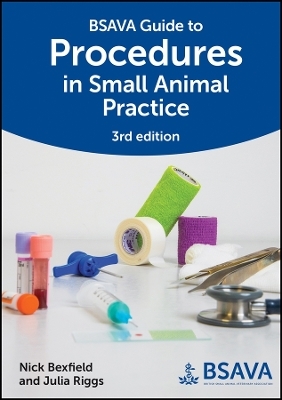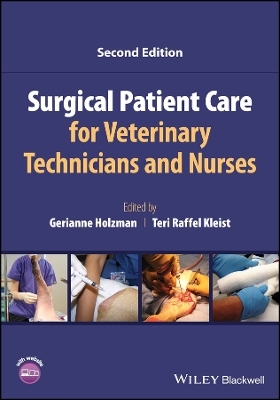
Veterinary Medical Education
Wiley-Blackwell (Verlag)
978-1-119-83354-3 (ISBN)
Veterinary Medical Education: A Practical Guide, Second Edition offers a comprehensive reference to all aspects of veterinary medical education, providing concrete guidance for instructors in a variety of settings. The book gives real-world, practical, veterinary-specific advice on all aspects of designing and implementing a veterinary curriculum. This Second Edition includes new and expanded information on widening access on admissions, competency-based veterinary education, academic advising and student support, eLearning, transition to practice and career opportunities, educational leadership and global veterinary education.
This revised edition has been significantly enhanced and updated, featuring twelve new chapters and many expanded chapters. It includes diagrams, figures, and informational boxes that highlight key points, clarify concepts, provide helpful tips and evidence from the literature, and examples of educational innovations that could be adopted in veterinary programs. Veterinary Medical Education covers:
Student selection, including widening access
Curricular innovations and competency-based veterinary education
Learning theories, eLearning, and their application in the classroom
Teaching in clinical and non-clinical settings and creating safe, inclusive learning environments
Programmatic and technology-enhanced assessment, academic advising and study skills, coaching, and mentoring
Professionalism and professional identity, cultural humility, and transition to practice
Program evaluation, educational leadership, and global trends
With comprehensive coverage of the field and a wealth of new and updated information, the Second Edition of Veterinary Medical Education is an indispensable resource for anyone involved with veterinary education, including instructors and faculty at veterinary colleges, continuing education instructors, veterinary technology instructors, and veterinarians training in internships and residencies.
The editors Jennifer L. Hodgson, BSVs(hons), Diplomate ACVM, GradCertEdStud, PhD, is a Professor of Population Health Sciences at the Virginia-Maryland College of Veterinary Medicine in Blacksburg, Virginia, USA. Jacquelyn M. Pelzer, DVM, MS, is Assistant Dean of Student Affairs and Admissions at the Virginia-Maryland College of Veterinary Medicine in Blacksburg, Virginia, USA.
List of Contributors xi
Preface xvii
Icons xix
Part 1 Student Selection 1
1 Student Selection 3
Jacquelyn M. Pelzer, James L. Weisman, and Eloise K.P. Jillings
2 Widening Access to Veterinary Education Through Student Selection 13
Eloise K.P. Jillings and Hilda Mejia Abreu
Part 2 The Curriculum 19
3 Curricular Design and Development 21
Jennifer L. Hodgson
4 Competency-based Veterinary Education 37
Kristin P. Chaney, Jared A. Danielson, and Jennifer L. Hodgson
5 Competency Frameworks and Milestones 47
Kristin P. Chaney and Emma K. Read
6 Entrustable Professional Activities 55
S. Kathleen Salisbury and Susan M. Matthew
7 Curriculum Mapping 67
Karen Dyer Inzana
8 Educational Leadership and Change Management 91
India Lane
Part 3 Learning Strategies 105
9 Learning Concepts and Theories, and Their Application to Educational Practice 107
Stephen A. May and Liz Armitage-Chan
10 Integrated Learning 121
Sunshine M. Lahmers
11 Collaborative Learning 133
Elizabeth Tudor, Laura Dooley, and Rachael-Kate Llewellyn
Part 4 Learning and Teaching Opportunities 153
12 Teaching for Active Learning in Small and Large Groups 155
Kathryn Mills, Susan M. Matthew, Jan Šlapeta, Mark B. Krockenberger, and Jacqueline M. Norris
13 Teaching in the Digital Age 173
Jodi A. Korich and Lisa M. Keefe
14 Teaching and Learning in Clinical Skills Laboratories 189
Sarah Baillie, Marc Dilly, and Rebecca Parkes
15 Learning in the Veterinary Teaching Hospital 199
Laura L. Nelson
16 Learning and Teaching in Real-world Settings 209
Philippa Gibbons and Tim J. Parkinson
17 Peer-assisted Learning 227
Laura K. Molgaard and Emma K. Read
Part 5 Assessing the Student 241
18 Concepts in Assessment 243
Jared A. Danielson and Kent Hecker
19 Assessment Methods 257
Jared A. Danielson, Kent Hecker, Matthew Pead, and Kirsty Fox
20 Constructive Alignment and Programmatic Assessment 279
Kent Hecker, Jared A. Danielson, Cees van der Vleuten, and Harold G.J. Bok
21 Technology-enhanced Assessment 293
Shane M. Ryan
22 Coaching and Feedback: Creating the Master Adaptive Learner 305
Karen K. Cornell and S. Kathleen Salisbury
23 Academic Standards and Progression 317
Kristin P. Chaney and Virginia R. Fajt
Part 6 Assessing the Program 327
24 Assessing Individual Teaching Effectiveness and Portfolios of Evidence 329
Susan M. Rhind, Catriona E. Bell, and Stephen A. Hines
25 Program Evaluation 343
Courtney Vengrin, Kent Hecker, and Jared A. Danielson
26 Benchmarking for Improvement 353
Rosanne M. Taylor and Paul C. Mills
27 Accreditation 363
Karen Martens Brandt and Paula Parker
Part 7 Teaching and Assessing Professional Competencies 375
28 Teaching and Learning Clinical Communication: An Action Plan 377
Cindy L. Adams and Suzanne M. Kurtz
29 Clinical Reasoning Skills 399
Jill Maddison
30 Professionalism and Professional Identity 411
Liz Mossop, India Lane, and Liz Armitage-Chan
31 Working in Professional Teams 429
Tierney Kinnison, David Guile, and Stephen A. May
32 Interprofessionalism 439
John H. Tegzes and Esther de Groot
33 Lifelong Learning and Reflective Practice 455
Nicole J.J.M. Mastenbroek, Sheena M. Warman, and Esther de Groot
34 Animal Welfare and Ethics 469
Joy M. Verrinder and Clive J.C. Phillips
35 Teaching Patient Safety Culture 487
Lydia Love and Erik H. Hofmeister
36 Cultural Humility 499
Lisa M. Greenhill, Kauline Cipriani, William Gilles, and Kimathi Choma
37 Business and Practice Management Skills 509
Joey Burt
38 Career Development: Pre- and Postgraduation 521
Valerie Ragan and Cassidy Rist
39 Employability and Successful Transition to Practice 533
Martin Cake and Melinda Bell
Part 8 The Educational Environment 549
40 Creating a Safe and Inclusive Learning Environment 551
Bobbi Conner
41 The Hidden Curriculum 557
Liz Mossop
42 Student Support and Wellness 569
McArthur Hafen, Jr., Adryanna Drake, and Bonnie R. Rush
43 Academic Advising and Strategies for Student Academic Success 585
Peggy L. Schmidt, Kimberly Jones, and Lynn M. Maki
44 Students with Disabilities in Veterinary Education 597
Joseph Taboada and Stephanie Johnson
45 Learning to Teach 609
Ayona Silva-Fletcher
46 Practical Educational Research 623
Jesse Watson
Part 9 Global Veterinary Education and Future Directions 637
47 Trends in Global Veterinary Medical Education 639
Andrew Maccabe and Caroline Cantner
48 Veterinary Medical Education: Envisioning the Future 647
M. Daniel Givens
Index 659
| Erscheinungsdatum | 09.02.2024 |
|---|---|
| Verlagsort | Hoboken |
| Sprache | englisch |
| Maße | 221 x 279 mm |
| Gewicht | 1610 g |
| Themenwelt | Veterinärmedizin |
| ISBN-10 | 1-119-83354-X / 111983354X |
| ISBN-13 | 978-1-119-83354-3 / 9781119833543 |
| Zustand | Neuware |
| Informationen gemäß Produktsicherheitsverordnung (GPSR) | |
| Haben Sie eine Frage zum Produkt? |
aus dem Bereich


